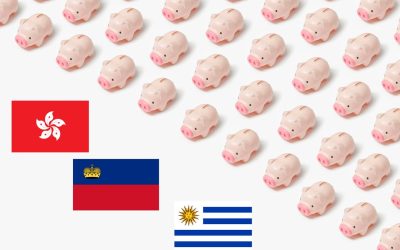Portugal has become a favourable destination for business owners seeking advantageous tax benefits. With its strategic location, vibrant business environment, and attractive tax policies, Portugal offers a range of incentives that make it an appealing choice for entrepreneurs and investors. In this article, we will explore the hidden advantages of Portugal’s tax benefits for business owners, shedding light on the opportunities and advantages that await those who choose to establish their businesses in this European country.
Corporate Tax Benefits on Madeira Island
Madeira Island, an autonomous region of Portugal, offers unique corporate tax benefits that are particularly appealing to business owners. The International Business Centre of Madeira (IBCM or MIBC) provides a highly competitive corporate tax rate of just 5% for companies engaged in international services, such as IT, consulting, and digital marketing. This reduced tax rate is applicable for ten years, making it an attractive proposition for businesses looking to optimize their tax liabilities.
Moreover, companies operating within the IBCM can benefit from various other tax advantages, including an exemption from withholding tax on dividend payments, interest, and royalties. This means that businesses can retain more of their profits and reinvest them into their operations or expansion plans. Additionally, the IBCM offers the possibility of accessing the European Union’s extensive network of double taxation treaties, further enhancing the tax benefits for businesses operating in Madeira.
Alternatively, companies incorporated outside the IBCM but still within the Autonomous Region of Madeira benefit from a corporate tax rate of 14,7%, which is way lower when compared with the standard 21% corporate tax rate that hits companies incorporated in the Portuguese mainland.
Madeira International Shipping Register
In addition to its corporate tax benefits, Madeira also boasts the Madeira International Shipping Register (MAR), which provides attractive tax advantages for ships and yacht owners and operators. The MAR also provides exemptions on several taxes, such as stamp duty, transfer tax, and value-added tax (VAT), on certain transactions. These advantages, combined with the island’s strategic location as a transatlantic stopover, position Madeira as a thriving maritime centre with a competitive tax framework.
Non-Habitual Resident (NHR)
Portugal’s Non-Habitual Resident (NHR) tax regime is another enticing tax benefit for business owners. The NHR regime allows eligible individuals (expats or Portuguese returning to the country) to benefit from a flat income tax rate of 20% on qualifying income derived from certain professions or high-value-added activities. This includes professions such as architects, engineers, artists, and medical doctors, among others.
Under the NHR regime, qualifying income derived from foreign sources can also benefit from a tax exemption in Portugal, provided it is subject to tax in the source country. This favourable tax treatment can result in significant tax savings for business owners, allowing them to allocate more resources towards business growth and innovation.
Tax Incentives for Startups and Entrepreneurs
Portugal has made significant efforts to foster entrepreneurship and innovation, offering a range of tax incentives tailored explicitly to startups and entrepreneurs. For example, the Startup Visa and the Digital Nomad Visa program provide a fast-track process for non-European Union entrepreneurs to establish their startups in Portugal. This program facilitates the relocation process and can be combined with the generous tax incentive package, the NHR scheme.
Furthermore, the Portugal Ventures program, an initiative by the Portuguese government, provides funding and support to innovative startups in various sectors. This program aims to stimulate entrepreneurship and attract foreign investment, offering tax benefits to investors who support these promising ventures. By investing in qualified startups, business owners can contribute to the Portuguese economy’s growth and benefit from attractive tax incentives.
Tax Benefits for Foreign Investors in Portugal
Portugal’s tax benefits extend beyond startups and entrepreneurs, catering to foreign investors. The Golden Visa program, for instance, offers residency permits to non-European Union citizens who invest in Portugal. This program provides an attractive path to European residency and citizenship, with the added benefit of various tax advantages.
Foreign investors acquiring real estate in Portugal can benefit from a reduced property transfer tax rate, potentially saving significant money. Additionally, certain regions in Portugal, such as the Algarve and Madeira, offer tax exemptions or reductions on property taxes for a specified period, further enhancing the tax advantages for foreign investors.
A Tax-Friendly Destination for Business Owners
Portugal’s tax benefits for business owners are undoubtedly a hidden advantage that can significantly impact the success and profitability of a business. From corporate tax benefits in Madeira Island to the NHR regime, tax incentives for startups and entrepreneurs, and tax benefits for foreign investors, Portugal offers a range of enticing opportunities. By taking advantage of these tax benefits, business owners can optimize their tax liabilities, retain more of their profits, and allocate resources towards growth and innovation. With its favourable tax policies and vibrant business environment, Portugal is a tax-friendly destination for business owners looking to maximize their potential. Consider Portugal your next business destination and unlock the hidden advantages of its tax benefits.
Explore the advantages of Portugal’s tax benefits for business owners today and discover the opportunities that await you. Start planning your business expansion or relocation to Portugal and reap the rewards of a tax-friendly environment. Contact us now to take the first step towards a successful and profitable venture in Portugal.

Miguel Pinto-Correia holds a Master Degree in International Economics and European Studies from ISEG – Lisbon School of Economics & Management and a Bachelor Degree in Economics from Nova School of Business and Economics. He is a permanent member of the Order of the Economists (Ordem dos Economistas)… Read more




